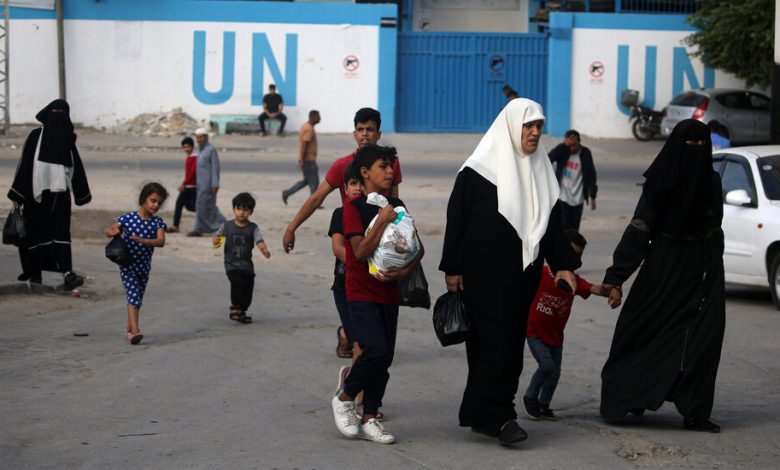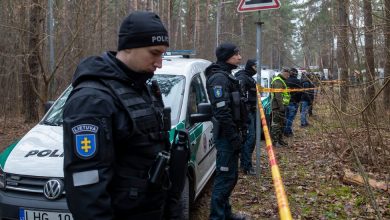With 102 Workers Killed, U.N. Agency in Gaza Struggles to Provide Aid

At least 102 workers from the largest United Nations agency in Gaza have been killed in five weeks of heavy Israeli bombing. Most did not die in the line of duty but instead while at home, often in strikes that also killed members of their families, U.N. officials said.
They were men and women. The largest number were teachers. Others included school principals, warehouse workers, engineers, a software developer, a gynecologist and a man in charge of staff safety. He was killed in his home along with his wife and their eight children, said Juliette Touma, the communications director for UNRWA, the agency that cares for Palestinian refugees and their descendants across the Middle East.
“It is a huge, huge loss,” Ms. Touma said. “Every day, we get more of these reports of our colleagues who were killed.”
The UNRWA employees, all Palestinians, have been killed in Gaza since Oct. 7, when Hamas, which controls the enclave, launched a deadly surprise attack on Israel, killing around 1,200 people, mostly civilians, and capturing another approximately 240 as hostages, Israeli officials say. The Israeli military responded with a punishing air campaign and ground incursions into Gaza that health authorities there say have killed more than 11,000 people, including thousands of children.
UNRWA, or the United Nations Relief and Works Agency, was created in 1949 to aid the more than 700,000 Palestinian refugees who fled or were forced from their homes during the war surrounding Israel’s founding in 1948. Of all the places UNRWA works, Gaza is where it plays the largest role, given that 1.4 million of the territory’s 2.2 million residents are registered refugees.
The soaring death toll has brought new attention to UNRWA, whose duties not only put workers in danger but also extend across much of Gazan life. It is one of the largest employers, with some 13,000 staff members who work at schools and health facilities and even oversee garbage pick up.
Now, UNRWA, which was struggling financially before the war, is facing the greatest crisis in its 64-year history, experts say. Many of its staff have been killed, its schools and other facilities are overflowing with displaced Gazans, and a siege imposed by Israel has so greatly disrupted its operations that it remains unclear how long it will continue to function and what role it might play in helping Gaza recover once the war ends.
From its outset, UNRWA defined Palestinian refugees as not just those who were personally displaced, but also their descendants, which meant that their number has grown over time.
So UNRWA also grew, now offering services to 5.9 million eligible refugees in Gaza, the West Bank, Lebanon, Jordan and Syria. After Hamas — which the United States, Israel and many other countries consider a terrorist organization — took control of Gaza in 2007, UNRWA became a key provider of basic services to Gaza’s refugees, making it akin to a civil service alongside departments run by the militant group.
The agency’s mandate never included resolving the issue of Palestinian refugees, but the organization’s existence has taken on great symbolism for both Palestinians and Israelis.
The Palestinians see the agency as official recognition that their displacement remains an issue waiting to be resolved. Israel rejects that idea, arguing that allowing the refugees to enter Israel would effectively destroy the Jewish state and accusing UNRWA of perpetuating Palestinian hopes for such an outcome.
Speaking to the U.N. Security Council in June, Ambassador Gilad Erdan of Israel called UNRWA a “destructive agency.”
“UNRWA continues to feed the Palestinian people a lie that the world supports their right of return. Let me be clear, there is no right of return,” he said. “The demand of returning millions of descendants of refugees is a demand to obliterate the Jewish people’s right to self-determination and this will never happen.”
Last week, Mr. Erdan went further, telling the council that “Many UNRWA workers in Gaza are themselves members of Hamas.”
Ms. Touma, the UNRWA media coordinator, rejected Mr. Erdan’s accusation, saying that all UNRWA staff were vetted and that their names were shared with host governments, meaning Israel in the case of Gaza. All coordination between the agency and the Hamas-affiliated authorities was in the interest of aid delivery, she said.
“Like anywhere in the world, the U.N. deals with all parties for the specific purpose to deliver humanitarian aid, and Gaza is no different,” she said. “We do it to carry out our mandate, and we do it at the technical level.”
The agency found itself at the center of the conflict’s information war when last month in a post on X, formerly Twitter, it accused Hamas officials of having “removed fuel and medical equipment from the agency’s compound in Gaza City.” After the Israeli news media seized on the comments, the agency deleted the posts.
Matthias Schmale, who headed UNRWA’s Gaza division until 2021, said that he was frequently referred to as a “governor” of Gaza, because of the agency’s wide-ranging activities, which include administering 183 schools for more than 280,000 children.
“That’s like running a midsized city,” said Mr. Schmale, making UNRWA “the biggest show in town” for primary education.
Nearly all of the agency’s funding comes from donations from countries including the United States, Germany and the European Union, but it has been struggling financially for years.
UNRWA entered 2023 with $75 million in debt and asked donors for $1.6 billion for its yearly budget, Ms. Touma said. But it had received less than half of that when the war began. Now, it has asked for an additional $481 million, mostly for Gaza.
As the war rages, most of the agency’s services are on hold as it focuses on providing emergency aid. More than half of Gaza’s population has been displaced because of Israel’s air campaign, and Israel has imposed a tight blockade, vowing not to let food, water or fuel into the territory. In recent weeks, only a trickle of aid trucks have entered Gaza via its border with Egypt.
The agency’s schools are shuttered and many of them are now among the more than 150 UNRWA facilities providing shelter for 730,000 people, the agency says.
Instead of running 14 food distribution centers, the agency is providing flour and fuel to bakeries, where Gazans often wait in line for hours to get bread.
The killings and displacement of UNRWA staff members and its inability to replenish its supplies have vastly limited its work, Ms. Touma said.
“We have seen in this war that food, water and fuel are being used as weapons of war,” she said.
It is too early to tell how the war will conclude and who will end up administering Gaza. Secretary of State Antony J. Blinken has suggested that the territory could eventually be reunited with the Israeli-occupied West Bank and governed by the Palestinian Authority, the internationally recognized representative of the Palestinians.
But on Saturday, Prime Minister Benjamin Netanyahu of Israel said his country must retain security control over Gaza “for as long as necessary” and dismissed the possibility of a role there for the Palestinian Authority.
Until a longer-term arrangement is made, UNRWA will likely remain the best placed organization to care for the population, experts say, although its battering by the war could leave it ill-equipped to do so.
“The scale of this is really unlike anything we have seen,” said Anne Irfan, a lecturer at University College London and the author of a recent book about UNRWA, referring to the Israeli bombardment of Gaza. “It is really difficult to see where we go from here, unless there are going to be really serious resources channeled into UNRWA.”
Aaron Boxerman contributed reporting from Jerusalem.




